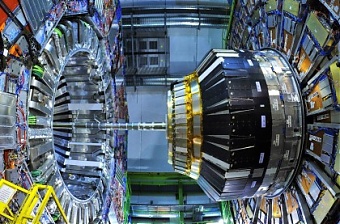Education and Science, EU – Baltic States, Latvia, Legislation, Technology
International Internet Magazine. Baltic States news & analytics
Tuesday, 23.12.2025, 05:20
CERN to start assessing Latvia's readiness for the membership
 Print version
Print version |
|---|
The ministry informed that the forming of the working group is a significant step in Latvia's path to membership in the organization. "That means that representatives of CERN's voting member states and representatives have given a positive assessment of the membership application drawn up by the Latvian Education and Science Ministry and Riga Technical University (RTU), as well as the work Latvia has done as it prepares to become an associated member of CERN," representatives of the Education and Science Ministry said.
Education and Science Minister Ilga Suplinska (New Conservative Party) believes that Latvia's accession to CERN in the status of associated member, like Latvia's recent admission to the European Space Agency as an associated member, can be regarded as a significant indicator of the quality and competitiveness of the Latvian science sector.
The minister believes that Latvia's associated membership in CERN will facilitate Latvian scientists' involvement in international research programs and promote interdisciplinary studies, as well as allow to attract international researchers to Latvia, thus promoting Latvia's economic growth.
The Education and Science Ministry expects Latvia to join CERN as an associated member around mid-2021.
As reported, On February 24, in Meyrin, Canton of Geneva, Latvian Foreign Minister Edgars Rinkevics submitted a letter signed by the Latvian Minister of Education and Science, Ilga Suplinska – Latvia’s application for membership in the European Organization for Nuclear Research, in the presence of Fabiolai Gianotti, Secretary of the CERN Council and the organisation’s Director-General.
The European Organisation for Nuclear Research (CERN) is an international organisation operating for the most part in research on particle physics. It was established in 1954 by 12 European countries. CERN currently has 23 Member States – Austria, Belgium, Bulgaria, the Czech Republic, Finland, France, Germany, Greece, Hungary, Israel, Italy, Netherlands, Norway, Poland, Portugal, Romania, Serbia, Slovakia, Spain, Sweden, Switzerland, and the United Kingdom. Cyprus and Slovenia are in the pre-stage to Membership; Croatia, India, Lithuania, Pakistan, Turkey and Ukraine are Associate Member States.
In 2019, the Latvian Government supported Latvia becoming an Associate Member State of the organisation from 2021 onwards. CERN’s main function is to provide the particle accelerators and other infrastructure needed for high-energy physics research. CERN hosts a large computing facility processing data from experiments, and it also happens to be the birthplace of the World Wide Web.
- 28.01.2022 BONO aims at a billion!
- 26.08.2021 LLC Dizozols Investments finalizes investment attraction deal with Crowdestor with record-high profits
- 25.01.2021 Как банкиры 90-х делили «золотую милю» в Юрмале
- 30.12.2020 Накануне 25-летия Балтийский курс/The Baltic Course уходит с рынка деловых СМИ
- 30.12.2020 On the verge of its 25th anniversary, The Baltic Course leaves business media market
- 30.12.2020 Business Education Plus предлагает анонсы бизнес-обучений в январе-феврале 2021 года
- 30.12.2020 Hotels showing strong interest in providing self-isolation service
- 30.12.2020 EU to buy additional 100 mln doses of coronavirus vaccine
- 30.12.2020 ЕС закупит 100 млн. дополнительных доз вакцины Biontech и Pfizer
- 29.12.2020 В Rietumu и в этот раз создали особые праздничные открытки и календари 2021








 «The Baltic Course» Is Sold and Stays in Business!
«The Baltic Course» Is Sold and Stays in Business!

